“At the conclusion of Her earthly life, the Mother of Christ was raised in soul and body to Heaven, that is, in the glory of eternal life, in full communion with God,” said Pope Francis when describing why on Aug. 15, 2022, the Church celebrates one of the most important feasts dedicated to the Blessed Virgin Mary: the Solemnity of Her Assumption.
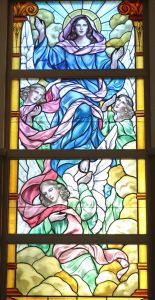 Pope Francis said that “Mary’s Assumption is a great mystery that concerns each one of us; it concerns our future. Mary, in fact, precedes us on the way on which all those go that, through Baptism, have bound their life to Jesus, as Mary bound her life to Him. That one of us dwells in the flesh in Heaven gives us hope: we understand that we are precious, destined to rise again. God does not allow our bodies to vanish into nothing. With God, nothing is lost… It is beautiful to think that the humblest and loftiest creature in history, the first to win heaven with her entire being, in soul and body, lived out her life for the most part within the domestic walls, she lived out her life in the ordinary, in humility.”
Pope Francis said that “Mary’s Assumption is a great mystery that concerns each one of us; it concerns our future. Mary, in fact, precedes us on the way on which all those go that, through Baptism, have bound their life to Jesus, as Mary bound her life to Him. That one of us dwells in the flesh in Heaven gives us hope: we understand that we are precious, destined to rise again. God does not allow our bodies to vanish into nothing. With God, nothing is lost… It is beautiful to think that the humblest and loftiest creature in history, the first to win heaven with her entire being, in soul and body, lived out her life for the most part within the domestic walls, she lived out her life in the ordinary, in humility.”
While the Blessed Virgin has entered into heavenly glory, the Holy Father added that “this does not mean that She is distant or detached from us; the Assumption should bring eternal hope to the faithful… May we not be robbed of hope, because this strength is a grace, a gift from God which carries us forward with our eyes fixed on heaven. Mary is always there… she accompanies them, suffers with them, and sings of hope with them and brings victory over death.”
The Catechism of the Catholic Church describes the Assumption as follows: “The Immaculate Virgin, when the course of her earthly life was finished, was taken up body and soul into heavenly glory, and exalted by the Lord as Queen over all things, so that she might be more fully conformed to her Son, the Lord of lords and conqueror of death.”
This Solemnity of the Assumption of the Blessed Virgin Mary is the oldest celebration of Our Lady. The original celebration, known as the “Memory of Mary” or “Falling Asleep” of Mary for it initially centered on the end of her earthly existence, is commonly known as her “dormition.”
Soon the name was changed to the “Assumption of Mary,” since there was much more to the feast than the end of her earthly life. The belief that Mary had been taken up, body and soul, into heaven dates to the Apostles.
It was clear from the beginning that there were no relics of Mary to be venerated, and that an empty tomb stood on the edge of Jerusalem near the site of the end of her earthly existence or dormition. That location also soon became a place of pilgrimage. (Today, the Benedictine Abbey of the Dormition of Mary stands on the spot.)
In 1950, Pope Pius XII proclaimed the Assumption of Mary a dogma of the Catholic Church, therefore, an ancient belief became Catholic Doctrine and the Assumption was declared a truth revealed by God.
The declaration of the dogma was to “make our belief in our own resurrection stronger and render it more effective,” Pope Pius XII stated in a proclamation.
The proclamation went on to say that the definition of the Assumption “will contribute in no small way to the advantage of human society, since it (reflects and builds up) the glory of the Most Blessed Trinity, to which the Blessed Mother of God is bound by such singular bonds.”
It was also expected that the faithful would be stirred up to a stronger piety toward their heavenly Mother and that those who meditate upon the glorious example Mary offers, be more and more convinced of the value of a human life entirely devoted to carrying out the heavenly Father’s will and to bringing good to others.
Pope Francis said the current devotion the faithful throughout the world have toward the Blessed Virgin confirms the earlier expectations of Pope Pius XII. “We pray to Mary in a particular way, through the Rosary. This prayer brings us closer to the Blessed Mother and to her Son. We join in her suffering and her glory and rejoice looking to eternity and giving us hope that we, too, will follow Our Lady when our life is ended.”
All the feast days of Mary mark the great mysteries of her life and her part in the work of redemption. The central mystery of her life and person is her divine motherhood, celebrated both at Christmas and a week later (Jan. 1) on the feast of the Solemnity of Mary, Mother of God. The Immaculate Conception (Dec. 8) marks the preparation for that motherhood, so that she had the fullness of grace from the first moment of her existence, completely untouched by sin. The Assumption completes God’s work in her since it was not fitting that the flesh that had given life to God himself should ever undergo corruption. (Note: As the Solemnity falls on a Monday in 2022, it is not obligatory to attend Mass.)






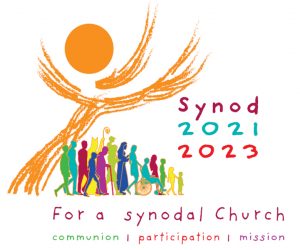
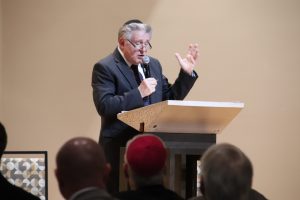 Rabbi Abraham Skorka and Pope Francis have served as examples of friendship and interreligious dialogue because they have lived out the call of Nostrae Aetate which acknowledges the Church’s bond with the Jewish people.
Rabbi Abraham Skorka and Pope Francis have served as examples of friendship and interreligious dialogue because they have lived out the call of Nostrae Aetate which acknowledges the Church’s bond with the Jewish people.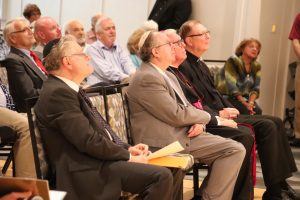 Bishop Frank J. Dewane also addressed the Catholic-Jewish Dialogue gathering, talking about the noble mission of the group.
Bishop Frank J. Dewane also addressed the Catholic-Jewish Dialogue gathering, talking about the noble mission of the group.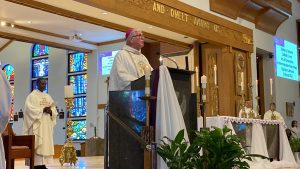 Pope Francis wrote to all the Bishops in the world, asking them to join him in offering “a solemn Act of Consecration of humanity, and Russia and Ukraine in particular, to the Immaculate Heart of Mary.” The Act of Consecration took place on the Solemnity of the Annunciation of the Lord, when the Angel Gabriel told Mary that she would conceive and bear “the Son of the Most High” through the power of the Holy Spirit.
Pope Francis wrote to all the Bishops in the world, asking them to join him in offering “a solemn Act of Consecration of humanity, and Russia and Ukraine in particular, to the Immaculate Heart of Mary.” The Act of Consecration took place on the Solemnity of the Annunciation of the Lord, when the Angel Gabriel told Mary that she would conceive and bear “the Son of the Most High” through the power of the Holy Spirit.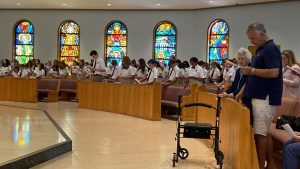 In a nearly full Cathedral, including students from Epiphany Cathedral Catholic School, Bishop Dewane remarked how important it was that the faithful gather “as a people of God, brothers and sisters in Christ, in response to the Holy Father. We gather to pray for the conflict going on in the Ukraine and the suffering that has been inflicted upon the people of Ukraine. It is a Consecration of humanity, as the Holy Father put it – in particular for those in Russia and Ukraine. This is a gesture of not just the Pope, Bishops, or priests, but of the Universal Church.”
In a nearly full Cathedral, including students from Epiphany Cathedral Catholic School, Bishop Dewane remarked how important it was that the faithful gather “as a people of God, brothers and sisters in Christ, in response to the Holy Father. We gather to pray for the conflict going on in the Ukraine and the suffering that has been inflicted upon the people of Ukraine. It is a Consecration of humanity, as the Holy Father put it – in particular for those in Russia and Ukraine. This is a gesture of not just the Pope, Bishops, or priests, but of the Universal Church.” For example, students at St. Catherine Catholic School in Sebring joined in the Consecration by praying the rosary. Students at Bishop Verot Catholic High School in Fort Myers gathered in their courtyard to recite the Act of Consecration. At Incarnation Parish in Sarasota, the faithful, as well as students from Incarnation Catholic School joined together. The Consecration also included time for Adoration of the Blessed Sacrament.
For example, students at St. Catherine Catholic School in Sebring joined in the Consecration by praying the rosary. Students at Bishop Verot Catholic High School in Fort Myers gathered in their courtyard to recite the Act of Consecration. At Incarnation Parish in Sarasota, the faithful, as well as students from Incarnation Catholic School joined together. The Consecration also included time for Adoration of the Blessed Sacrament. Pope Francis said during remarks from Rome that the consecration “is no magic formula but a spiritual act… It is an act of complete trust on the part of children who, amid the tribulation of this cruel and senseless war that threatens our world, turn to their Mother, reposing all their fears and pain in Her Heart and abandoning themselves to Her.”
Pope Francis said during remarks from Rome that the consecration “is no magic formula but a spiritual act… It is an act of complete trust on the part of children who, amid the tribulation of this cruel and senseless war that threatens our world, turn to their Mother, reposing all their fears and pain in Her Heart and abandoning themselves to Her.”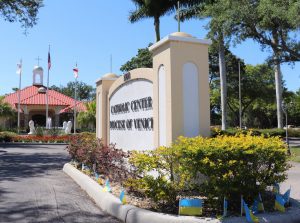 Bishop Dewane added that the Act of Consecration “is about people who are suffering. The Lord calls us to be His instruments and to pray and to call upon our Faith; to call upon Christ; to call upon the saints; to intervene to relieve that suffering that we see so much of – also intervene in that war in Ukraine.”
Bishop Dewane added that the Act of Consecration “is about people who are suffering. The Lord calls us to be His instruments and to pray and to call upon our Faith; to call upon Christ; to call upon the saints; to intervene to relieve that suffering that we see so much of – also intervene in that war in Ukraine.”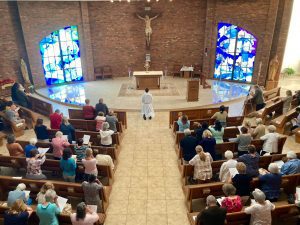 The practice of Consecration to the Immaculate Heart of Mary is closely linked to the apparitions of Our Lady of Fatima. During the third apparition, on July 13, 1917, the Blessed Virgin Mary told three visionaries that God sought to establish the devotion to Mary’s Immaculate Heart in the world, stating that if this request was not granted, Russia would “spread her errors throughout the world, causing wars and persecutions of the Church.” Pope Francis, and previous Popes, have led various consecrations to the Immaculate Heart of Mary, for example, St. John Paul II’s consecration of Russia to the Immaculate Heart of Mary on March 25, 1984.
The practice of Consecration to the Immaculate Heart of Mary is closely linked to the apparitions of Our Lady of Fatima. During the third apparition, on July 13, 1917, the Blessed Virgin Mary told three visionaries that God sought to establish the devotion to Mary’s Immaculate Heart in the world, stating that if this request was not granted, Russia would “spread her errors throughout the world, causing wars and persecutions of the Church.” Pope Francis, and previous Popes, have led various consecrations to the Immaculate Heart of Mary, for example, St. John Paul II’s consecration of Russia to the Immaculate Heart of Mary on March 25, 1984. Bishop Dewane has stressed the importance of continued prayer for those suffering. Also, the Diocese of Venice has made it possible for the faithful to contribute toward charitable relief and assist in providing humanitarian aid, as well as necessary recovery efforts.
Bishop Dewane has stressed the importance of continued prayer for those suffering. Also, the Diocese of Venice has made it possible for the faithful to contribute toward charitable relief and assist in providing humanitarian aid, as well as necessary recovery efforts.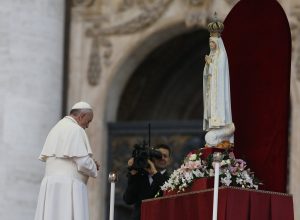 The Consecration will take place at Epiphany Cathedral, 350 Tampa Ave. W., Venice, beginning at noon with the Prayer of Consecration and followed by the Mass. All are invited to participate. The Consecration and Mass will also be livestreamed via Facebook.
The Consecration will take place at Epiphany Cathedral, 350 Tampa Ave. W., Venice, beginning at noon with the Prayer of Consecration and followed by the Mass. All are invited to participate. The Consecration and Mass will also be livestreamed via Facebook.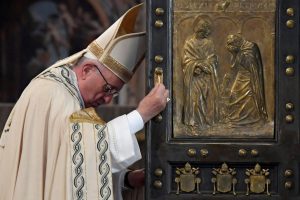 The Holy Father said his hope is that we can recover “a sense of universal fraternity and refuse to turn a blind eye to the tragedy of rampant poverty that prevents millions of men, women, young people and children from living in a manner worthy of our human dignity.” This highlight of hope by the Holy Father comes at a time of war in the Ukraine.
The Holy Father said his hope is that we can recover “a sense of universal fraternity and refuse to turn a blind eye to the tragedy of rampant poverty that prevents millions of men, women, young people and children from living in a manner worthy of our human dignity.” This highlight of hope by the Holy Father comes at a time of war in the Ukraine.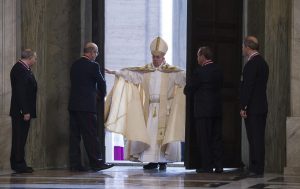 The Holy Father said that a significant step on this journey was already taken with the celebration of the Extraordinary Jubilee of Mercy (2016), “which allowed us to appreciate anew all the power and tenderness of the Father’s merciful love, in order to become, in turn, its witness.”
The Holy Father said that a significant step on this journey was already taken with the celebration of the Extraordinary Jubilee of Mercy (2016), “which allowed us to appreciate anew all the power and tenderness of the Father’s merciful love, in order to become, in turn, its witness.”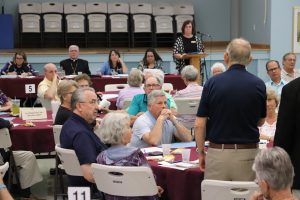 Some 115 people participated on Feb. 16, 2022, at Epiphany Cathedral in Venice, and then another 100 participated on Feb. 22 at Ss. Peter and Paul the Apostles Parish in Bradenton. The Bradenton Listening Session was offered in both English and Spanish.
Some 115 people participated on Feb. 16, 2022, at Epiphany Cathedral in Venice, and then another 100 participated on Feb. 22 at Ss. Peter and Paul the Apostles Parish in Bradenton. The Bradenton Listening Session was offered in both English and Spanish. The second main theme which is under consideration is “Listening.” This theme is described by the Synod as follows: “The synodal process necessitates that we, as the People of God, first listen with an open heart and open mind to where the Spirit is calling us and discern to whom we are needing to listen and what steps need to be take to more fully live out our mission.”
The second main theme which is under consideration is “Listening.” This theme is described by the Synod as follows: “The synodal process necessitates that we, as the People of God, first listen with an open heart and open mind to where the Spirit is calling us and discern to whom we are needing to listen and what steps need to be take to more fully live out our mission.”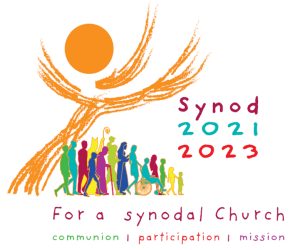
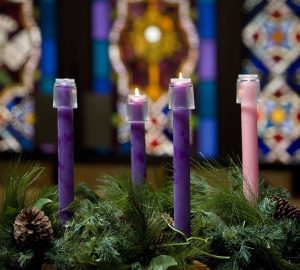 Advent begins on Nov. 28, 2021, the start of the new Liturgical Year, therefore it is appropriate to begin anew and raise one’s heart and mind to Christ’s second coming at the end of time and prepare for the celebration of the anniversary of the Lord’s birth.
Advent begins on Nov. 28, 2021, the start of the new Liturgical Year, therefore it is appropriate to begin anew and raise one’s heart and mind to Christ’s second coming at the end of time and prepare for the celebration of the anniversary of the Lord’s birth.